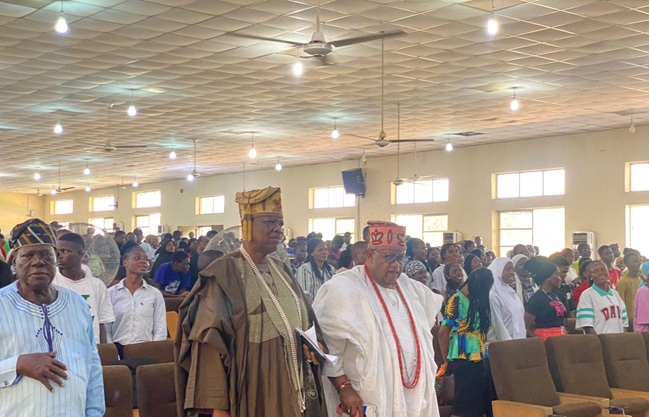World-renowned scholar, Professor Toyin Falola, has highlighted digital transformation, electronic learning and other innovations as critical to the future of higher education in Nigeria.
He made this known while speaking on the subject of the future of higher education in Nigeria at the 2024 Open Lecture of the Faculty of Education, Olabisi Onabanjo University, Ogun State on Monday. Professor Falola is the Jacob and Frances Sanger Mossiker Chair in the Humanities at the University of Texas at Austin.
Falola forecasted that e-learning will play a transformative role in Nigeria’s higher education landscape, particularly as a solution to issues like campus overcrowding and rigid scheduling. He highlighted how online education can reach more students who face barriers to traditional classroom settings, explaining that “media-rich, blended learning platforms with low bandwidth intensity can circumvent connectivity issues, offering quality education across the country.”
However, digital transformation alone is not enough. Falola argued that curriculum reforms must address real-world demands, focusing on market-relevant skills in technology, entrepreneurship, and critical thinking. “To strengthen the economy, we need to train students who are not only job-ready but are also equipped to thrive in a dynamic, technology-driven world,” he said, stressing the importance of aligning education with Nigeria’s broader economic needs.
Falola noted that, while Science, Technology, Engineering, and Mathematics (STEM) fields would likely continue to receive the majority of institutional support, the humanities must not be neglected. He argued that, with enhanced skill-based training, the humanities could also contribute significantly to Nigeria’s development. “It’s essential to support the humanities in ways that emphasize critical skills, as these disciplines foster cultural insight and ethical reasoning, which are invaluable in a modernizing economy,” Falola explained.
Falola underscored the persistent funding shortfalls facing Nigeria’s educational sector, calling for creative solutions to bridge the gap. “Sustainable funding remains a major challenge,” he said, “but public-private partnerships offer a promising path forward.” Such collaborations, he noted, could boost investment in infrastructure, technology, and teaching resources, all essential to improving Nigeria’s educational quality.
He urged the Federal Government to consider policy reforms, including revisiting its no-tuition policy and, where feasible, consolidating universities with low enrollment numbers to optimize resources. Additionally, he suggested that universities taken over by states should be returned, while mission and community schools could be handed back to their original owners to maximize resource allocation.

Highlighting the importance of international collaborations, Falola suggested that partnerships with foreign universities could elevate Nigerian institutions through joint research projects, exchange programs, and dual-degree options. “Such collaborations could improve the quality and acceptance of Nigerian degrees, attract quality students and scholars, and support local research development,” he observed.
Professor Falola drew attention to Nigeria’s infrastructural challenges, noting that overcrowded classrooms and outdated equipment are detrimental to learning outcomes. He advocated for further expansion of distance-learning institutions to make higher education more accessible to students in remote and underserved areas. “With expanded access, we can open doors for students across Nigeria, regardless of their location,” Falola emphasized.
Recognizing Nigeria’s rapidly growing youth population, Falola stressed the importance of technical and vocational training. With youth unemployment a pressing issue, he suggested that providing a wider array of career paths could be instrumental in helping young Nigerians succeed. He also advocated for student inclusion in university governance, noting that students’ voices are essential in creating an accountable and responsive education system.
As he concluded, Falola called for a collaborative, forward-looking approach to tackle the educational needs of Nigeria’s future. His vision highlights the urgent need for strategic investments, curriculum reforms, and policy adjustments. He emphasized that only by adopting an inclusive and innovative approach can Nigeria’s higher education system evolve to support economic growth, digital literacy, and equal opportunity for all.
READ ALSO FROM NIGERIAN TRIBUNE







